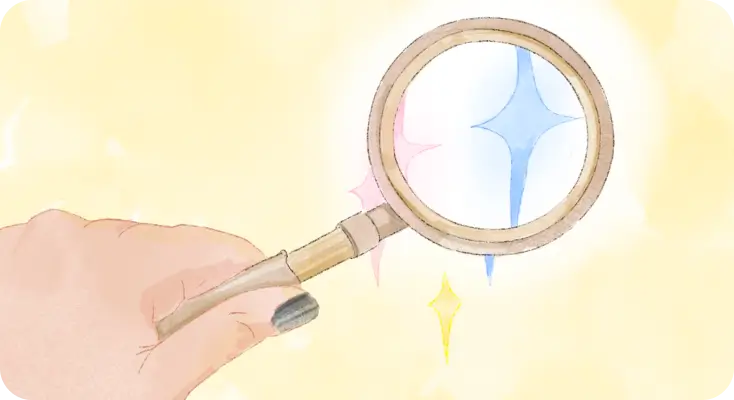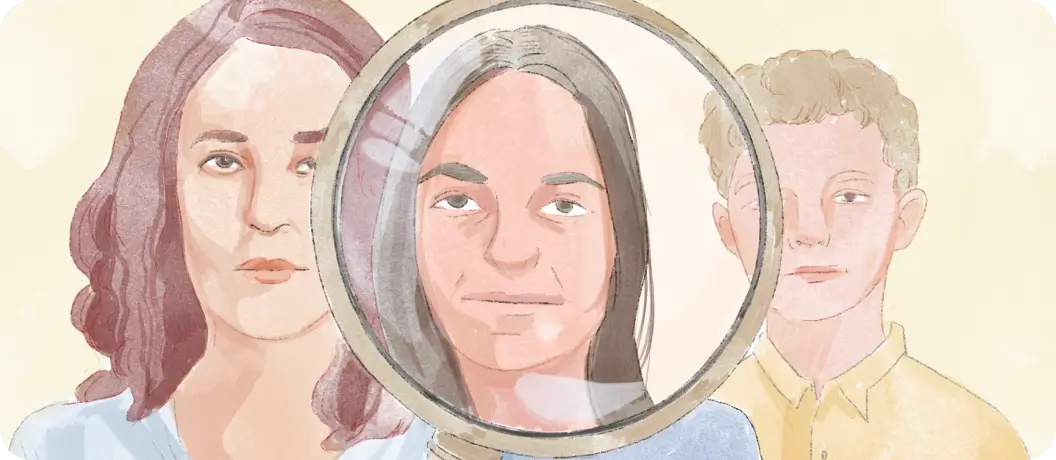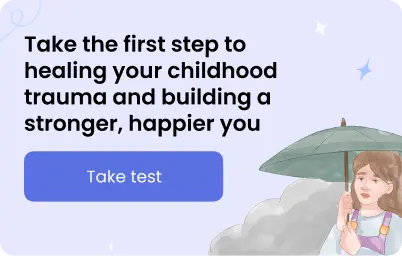Always felt like you’re the family’s lightning rod? Like the one who always gets blamed for everything, no matter what? Maybe you’ve heard things like, “Why can’t you be more like your sister?” or “You’re the reason this family’s falling apart.”
Or you could be eating a sandwich, and somehow, it’s your fault the dog chewed up the couch. If so, that might be the pattern of a scapegoat child.
Growing up as a family scapegoat can feel like being in a constant battle you can’t win. The weight of the world seems to rest on your shoulders, and no matter what you do, it’s never enough.
These early experiences can have long-lasting effects, shaping how you see yourself and interact with the world. But remember, your past does not define you.
Are you wondering if you’re actually a scapegoat child? We’ve got a quick “Am I a scapegoat child?” quiz to help you figure it out. Let’s explore this together and find a way to break free from the blame game.
What is a scapegoat child?
The definition of “scapegoat” is originally rooted in scapegoat theory, a psychological concept suggesting that people might often channel their anger and frustration onto one person instead of dealing with the real issues. In a family, such a person, usually a child, may become the scapegoat.
This is a form of emotional abuse where one person is made to carry the burden of the family’s negative emotions and behaviors.
An example of a scapegoat theory can be the parents who might accuse the child of being the reason for the family’s financial struggles, suggesting that the child is causing the family hardship.
A scapegoat child might be seen as one of the narcissist family roles, where one or both parents have an inflated sense of self-importance and lack empathy.
Such kids might bear the burden of parental criticism, punishment, and blame, regardless of their actual behavior. They may be seen as the black sheep of the family.
This destructive dynamic might also lead to enmeshment trauma, where a kid has unhealthy closeness and dependency within a family. In such families, boundaries between members are blurred, resulting in one person becoming the enmeshed family scapegoat.
Consequently, a scapegoat child may develop low self-esteem, anxiety, depression, and overall, contributing to childhood trauma. However, such dynamics might also create strong survival skills and a keen sense of injustice in children.
A scapegoat child typically exists in contrast to the golden child. Both roles are created by the dysfunctional family system to mask parental insecurities.
So, what sets these two roles apart? Let’s take a closer look.
Scapegoat child & golden child
So, what does it mean to be a golden child? Such children are idealized, seen as perfect, and capable of no wrong.
They often become the parent’s favorite and receive disproportionate praise and rewards.
In contrast, the scapegoat child is blamed for nearly everything that goes wrong in the family. They are criticized, punished, and held responsible for the parent’s emotional well-being.
For example, both the golden child and the scapegoat may achieve academic success, yet one is praised as a genius while the other child’s accomplishment is dismissed or attributed to luck.
Both children are deeply affected by their roles, experiencing emotional turmoil and challenges in their relationships.
But is the impact on mental health different for the scapegoat child and the golden child? This is what Hannah Schlueter, MA, LAC, says:
For example, a similarity might be that both experience difficulty forming and maintaining meaningful relationships, but the root cause will be for different reasons and may present differently depending on what role the child had in their family.
Some differences likely include the impact of self-esteem and sensitivity to criticism as well as the ability to regulate emotions, and solve problems.
The most frequent difference I have seen is that the presence of anxiety is higher amongst golden children, and depression is higher amongst scapegoat children.
Despite this pattern not applying to everyone, the mental health challenges associated with golden child and scapegoat children are nonetheless significant.
Now, let’s continue to explore what scapegoating is to understand its impact on a person’s life. Recognizing the signs can help people break free from this toxic pattern.
Before exploring signs, let’s take a quick test to understand if you might be a scapegoat in your family.
Take a “Am I the scapegoat child?” quiz
Meanwhile, once we fully understand the signs of a scapegoat child, let’s take a quiz to determine if you might have been a scapegoat child in adulthood.
Disclaimer: While a quiz can provide some initial insights, it’s important to remember that it’s not a definitive diagnosis. If you’re deeply concerned about feeling like a scapegoat in your family, consider seeking professional help from a therapist.
How many of these ten signs, symptoms, and experiences do you relate to?
Answer “yes” or “no” to the following questions:
- Have you frequently felt like the negative focus in your family, as if you were blamed or made to feel responsible for problems that weren’t entirely your fault?
- Did you grow up always feeling like the “problem child”? Do you still feel trapped in these roles?
- Do you tend to put others’ needs before your own, or do you struggle with intense emotional reactions to your environment?
- Were you often dismissed or contradicted when expressing your thoughts and feelings, especially if they differed from the family narrative?
- Are your relationships with siblings strained, or do you have a sibling who dominates or controls you?
- Have you dealt with issues like addiction or unhealthy dependency on others?
- Do you find it challenging to identify and express your own needs and feelings?
- Do you prioritize peace over your own well-being?
- Have you had trouble building healthy, trusting relationships as an adult?
- Do you experience chronic anxiety, depression, or severe self-doubt, including imposter syndrome?
- Have you limited contact with toxic family members but feel guilt or shame for doing so?
Scoring of a “Am I the scapegoat child?” quiz
0-2 “Yes” answers:
There is a low likelihood of scapegoating. While it’s possible to experience some elements of scapegoating without fitting the full profile, it’s essential to consider other factors within your family dynamics.
These questions may have touched on common family tensions rather than systemic scapegoating.
Tip: Take some time to reflect on your family relationships. Are there specific patterns of interactions that cause you distress? If you feel like a family scapegoat, consider discussing your concerns with a trusted friend, family member, or therapist.
3-10 “Yes” answers:
If you answered “yes” to several of these questions, it’s possible that you may have been a scapegoat child. It’s important to remember that these are just a few potential signs, and your experiences may be unique. Consider talking to a therapist or counselor specializing in toxic family dynamics or trauma.
Tip: Engaging in self-care activities, such as meditation, exercise, or spending time in nature, can help you cope with the emotional challenges associated with scapegoating.

7 signs of family scapegoat
Many families experience challenges, and occasional conflicts are typical. But in some families, one person frequently gets the blame for everything.
Like, if there’s a fight, it’s automatically their fault. Or if something breaks, they’re the ones who did it, no matter what.
Over time, this pattern of family scapegoating can lead to significant emotional and psychological harm that may persist into adulthood.
Other issues can include difficulty with boundaries, social isolation, and challenges with conflict resolution. The experience of a scapegoat child has lasting effects on how they see themselves, others, and the world around them.
So, what are the signs of a family scapegoat? While not everyone experiences all of them, there are common indicators to look for:
1. You’re always the bad guy
Ever feel like no matter what, you’re the one everyone blames? You might start feeling guilty all the time. It’s like you’re the family’s lightning rod. That might be one characteristic of a family scapegoat.
This can range from minor disagreements to major family crises.
For instance, if your family is going through a difficult time, like a divorce or financial hardship, you, as a scapegoat child, might be blamed for causing the problem or not doing enough to help.
Constant blaming may also be one of the signs of scapegoating daughters of narcissistic mothers.
- You might hear, “It’s always your fault we’re late,” “If you hadn’t done that, we wouldn’t be in this mess,” or “You’re the reason why we’re fighting.”
- Tip: You may respond, “I understand you’re upset, but I wasn’t responsible for that.” It’s okay to stand your ground. You don’t have to be the family’s punching bag.
2. You feel like an invisible one
Sometimes, it may feel like you’re always the last to know or the one left out of the loop. Maybe family plans are made without you, or you’re excluded from important conversations and activities.
It’s like you’re not part of the group, which may lead to feeling like a family scapegoat.
- You might hear, “We’ll call you later to tell you what we decided,” “You wouldn’t understand anyway,” or “We’re going to do something without you.”
- Tip: If you feel like a scapegoat in the family, find things you love to do and people who make you feel good. It’s important to have your own life, too.
3. They are always picking on you
This is another sign of a family scapegoat child. You may be given hurtful and unfair labels that define your character. These labels can be persistent and damaging to your self-esteem and overall well-being.
- You might hear, “You’re the problem one,” “You’re always causing trouble,” or “You’re selfish and ungrateful.”
- Tip: Remind yourself that these labels are untrue and don’t define who you are. If you feel like a family scapegoat, seek support from a therapist or counselor to help you challenge these negative beliefs.
4. Double standards
You might be held to different standards than other family members. Your mistakes are magnified and punished, while others are overlooked or excused.
Let’s consider the situation when you accidentally break a vase. You may be grounded for a week and lose your allowance.
However, when your younger brother breaks a similar vase, he gets a mild scolding and no punishment. This might be a sign of a scapegoat child.
- You might hear, “You can’t go out because you’re always getting into trouble,” “Your brother can stay out late, but you can’t,” or “You should be more responsible like your sister.“
- Tip: If the same patterns appear in your life and you feel like a scapegoat child in adulthood, communicate your feelings about the unfair treatment calmly and assertively.
5. Constant criticism
Do you feel like nothing you do is ever good enough? That might also be one characteristic of a family scapegoat.
You might be criticized for your appearance, behavior, or choices. Nothing you do is ever good enough. Constantly being under criticism can impact your self-worth and lead to people-pleasing behavior.
- You might hear: “You look terrible in that outfit,” “You’re so lazy,” or “You never listen.”
- Tip: Practice self-compassion and focus on your strengths. Surround yourself with people who appreciate and support you.
6. Gaslighting
Have you ever asked yourself, “Why am I so sensitive?” Family gaslighting can contribute to heightened sensitivity, often experienced by scapegoat children.
When experiencing gaslighting in the family, members may twist your words to make it seem like you’re the problem or manipulate you into questioning your memory and perception of events.
- You might hear, “You’re too sensitive,” “You’re imagining things. Nothing happened like this,” or “You’re just trying to start trouble.”
- Tip: If something doesn’t feel right, it probably isn’t. Trust your instincts and seek validation from people who believe you, or seek additional support from a professional.
7. Isolation
Last but not least, you might be a scapegoat child if your family tries to isolate you from friends or other family members.
This isolation might help them maintain control and prevent you from seeking outside support. Such dynamics may lead to a fear of abandonment and loneliness.
- You might hear: “Don’t hang out with them,” “They’re a bad influence,” or “You don’t need to see them.”
- Tip: Hold onto your friends. They’re important. If your family is making it hard, talk to someone about it.
Remember to prioritize your mental health and well-being. Seeking professional help can provide valuable guidance and support.
Also, you can try our 28-Day Well-being Healing Plan to improve your overall well-being and discover a path to healing. Our engaging courses and relaxing games can bring you many benefits, including:
- Reduced stress and anxiety
- Increased energy levels
- Improved sleep quality
- Enhanced mood and emotional balance
- Greater self-awareness and mindfulness
Remember, you are not defined by the role you were given but by the person you’ve become.
Disclaimer
This article is for general informative and self-discovery purposes only. It should not replace expert guidance from professionals.
Any action you take in response to the information in this article, whether directly or indirectly, is solely your responsibility and is done at your own risk. Breeze content team and its mental health experts disclaim any liability, loss, or risk, personal, professional, or otherwise, which may result from the use and/or application of any content.
Always consult your doctor or other certified health practitioner with any medical questions or concerns
Breeze articles exclusively cite trusted sources, such as academic research institutions and medical associations, including research and studies from PubMed, ResearchGate, or similar databases. Examine our subject-matter editors and editorial process to see how we verify facts and maintain the accuracy, reliability, and trustworthiness of our material.
Was this article helpful?




